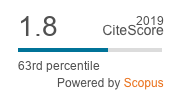The intangible index in bank management
Abstract
Purpose: Our research objective is to perform a descriptive analysis of the information on intangible assets disclosed by Spanish banks indexed on the IBEX 35 as a step prior to the creation of which allows us to eventually create a specific disclosure index for this type of content during 2010-2012, the most critical years of the crisis in Spain.
Design/methodology/approach: In a first section of the methodology, it has been carried out a content analysis using five categories that cover all the terms that were considered the most relevant in the literature on intangible assets: concepts of intellectual capital, human capital, structural capital, relational capital and usefulness of information. This information has been the basis for the design of an index by categories and global as a second part of the methodological design.
Findings: Our results found that the disclosure level of Spanish financial entities in terms of intangibles is reduced with an aggregate index of intangible assets of 0.2698 (between 0 and 1). Although, within the categories proposed it can be highlighted the priority role of the usefulness information index followed by the relational and human capital indexes.
Research limitations/implications: The study focuses on 2010 to 2012, which conditions and justifies the results obtained for a period of crisis such as the one analyzed.
Practical implications: Our results confirm that the financial entities have not bet for the use of the disclosure of information on intangibles during the crisis despite their potential value in order to guarantee a competitive business performance.
Social implications: Managers of financial institutions may have a comparative vision of the disclosure of intangibles and adopt future disclosure policies that consider the value of this information.
Originality/value: As the main contribution, this paper incorporates the results of a specific index on intangibles (both globally and specifically for 5 categories) for financial institutions. Our results open future lines of research that analyze why not use this information for competitive purposes and, specifically, to gain confidence in a context as difficult as that experienced in the years of crisis studied.
Keywords
DOI: https://doi.org/10.3926/ic.1366
This work is licensed under a Creative Commons Attribution 4.0 International License
Intangible Capital, 2004-2024
Online ISSN: 1697-9818; Print ISSN: 2014-3214; DL: B-33375-2004
Publisher: OmniaScience








